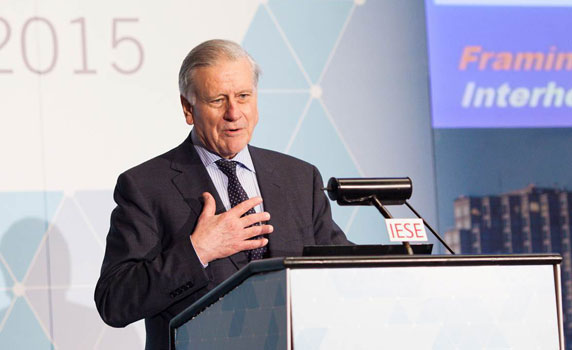
Cardiovascular diseases have cost the U.S. a staggering $444 billion in health care over the last few years alone. But it’s an economic burden that could be dramatically reduced through education, says Director in Chief of New York’s Mount Sinai Hospital, Dr. Valentín Fuster.
Speaking at the IESE Miami Business Summit, Fuster warned that medical costs are set to rise exponentially as the world’s population ages. New, innovative approaches to funding – and education – are urgently needed, he said, in the fight against these diseases.
Fuster, who is also Editor-in-Chief of the Journal of the American College of Cardiology, and former President of the World Heart Association, was interviewed by CNN’s Gabriela Frías at the Miami Business Summit in May.
The summit, which attracted more than 200 international business executives and alumni, was celebrated under the banner: Driving Sustained Growth.
According to Fuster, the billions of dollars spent annually treating heart disease – the leading cause of death worldwide – could be significantly reduced by educating youngsters from an early age.
Taking Responsibility to Effect Change
Fuster’s SHE Foundation has set up a number of initiatives around the globe, including a large-scale study of children in Colombia and Spain. Youngsters between the ages of three and six have been educated on the importance of healthy eating and exercise, and their behavior and health will be monitored over a 20-year period.
It is important, says Fuster, to present hard evidence when lobbying governments to implement wide-ranging change. "You convince governments with facts and data," he said, citing positive outcomes from his studies have recently been published in the American Journal of Medicine.
But much can be done at a grassroots level, if individuals and business leaders assume a greater sense of responsibility.
"You can do much more than those in government – it’s all about leadership and motivation," said Fuster, calling for business leaders to do more to promote health within their organizations.
"It’s important to focus on the positive," he said, "and try to encourage healthy habits rather than preventative measures."
Driving Sustainable Growth in the Americas
The Miami Business Summit delivered a full academic program that ranged from the perspective of multinationals operating in the Americas, and challenges facing the banking sector as it aims for sustainable growth, to the myriad opportunities for business at the intersection of innovation, technology and (intra)entrepreneurship.
Delegates heard from distinguished keynotes representing these sectors, such as Venture Hive founder, Susan Amat; Pablo Slough, head of mobile ad solutions at Google; and Lionel Olavarría, VP at BCI.
The summit was opened by Associate Dean of IESE, Professor Eric Weber, who invited attendees to join him in celebrating the 50th anniversary of the IESE MBA – a landmark that is being commemorated throughout 2015.
IESE in the Americas
IESE is seeing growing consolidation of its presence in the Americas. The New York campus is gaining international traction as a hub for global business research, and offers a full suite of executive education programs that span a broad diversity of profiles and sectors.
IESE’s executive education portfolio was recently ranked first in the world by the Financial Times (read news).
In Sao Paulo, IESE delivers a number of strategic programs for executives, including programs for senior executives, leadership programs, the Executive MBA Brazil and the Global CEO program, which is administered in collaboration with Wharton.